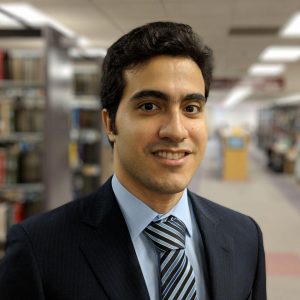
The Colleges of Computing and Engineering invite the campus community to a lecture by faculty candidate Mohammad Khalili on February 24, 2020, at 3:00 p.m., in Chem. Sci. 102. Khalili’s talk is titled, “Security and Privacy Management: The Role of Cyber Insurance and Randomized Algorithms.”
Mohammad Mahdi Khalilgarekani is a postdoctoral research associate in the Department of Electrical Engineering and Computer Science at the University of California, Berkeley. His research interests are in security economics, algorithmic fairness, data privacy, optimization, and machine learning.
Khalili received a Ph.D. in electrical and computer engineering from the University of Michigan in 2019, an M.Sc. degree in applied mathematics from the University of Michigan in 2018, and a M.Sc. and B.Sc. in electrical engineering from Sharif University of Technology, Iran, in 2015 and 2013, respectively.
Lecture Abstract: Cyber technologies have brought enormous benefits to our society over the past decades and people and communities are more connected than ever before. On the other hand, these technologies provide opportunities for damaging data breaches and large-scale cyber attacks–incidents that can compromise sensitive data, cause business interruptions, and ruin a company’s reputation.
In his talk, Khalili will discuss the role of cyber insurance in addressing security issues, focusing on two features of cybersecurity that differentiate cyber insurance from other types of insurance: the interdependent nature of cyber risks and our ability to perform an accurate quantitative assessment of a firm’s security posture. These features can serve as incentive for profit-maximizing cyber insurers to design insurance contracts that encourage higher security investment, thus improving network security.
Kahlili will also discuss some privacy issues raised in a distributed optimization problem where multiple entities collaboratively work toward a common optimization objective (e.g., training a classifier). Using an interactive process of local computation (over local, private data) and message passing, this information exchange leads to privacy leakage and attackers can infer a user’s personal information from the exchanged computations. A randomized algorithm is introduced to protect an individual’s privacy such that the privacy leakage only happens in half of the iterations, improving the privacy-accuracy tradeoff in comparison to existing algorithms.
Khalili was a recipient of the University of Michigan Rackham Fellowship and the outstanding master’s thesis award from Sharif University of Technology, both in 2015, and in 2018 he was a finalist for the Eleanor Towner dissertation award.